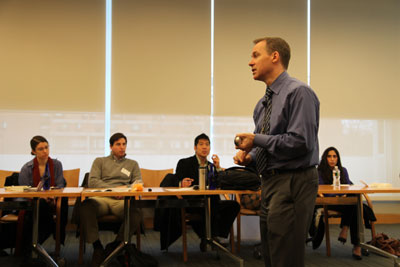McMahon Shares Career Development Tips for Medical Educators

Graham McMahon, of BWH Endocrinology, presents “Developing Your Career as a Medical Educator” in the Shapiro Breakout Room as part of the Department of Medicine’s Faculty Career Development Seminar series. |
BWH associate physician Graham
McMahon, MD, MMSc, knew early on that his particular path in medicine would consist
of healthy doses of both clinical practice and education.
"I have always been a keen observer of
teachers and extremely engaged with educational development," said McMahon, who
is the medical education editor of the New
England Journal of Medicine. "I am interested in taking the road less
traveled."
McMahon earned his medical degree from
the Royal College of Surgeons in Ireland and a
doctorate in education from the National
University of Ireland. He subsequently completed his residency and
endocrinology fellowship at BWH, and earned a master's degree in clinical
research from Harvard University.
As a firm believer in people's power to
forge their own career identities, it's no wonder that McMahon was asked to
present "Developing Your Career as a Medical Educator" early this month as part
of the Department of Medicine's Faculty Career Development Seminar series, held
in the Shapiro Breakout Room.
"You can create new career opportunities
and open doors through volunteering," said McMahon. "Opportunities beget
themselves; you have to be an academic entrepreneur."
McMahon reflected on strategies for physicians who seek to integrate
medical education activities into their academic and clinical careers, elaborating
on 10 key concepts for medical educators:
1)
Let your peers know of your interests. You
won't be asked to collaborate on teaching projects if others don't know you're
interested.
2)
Identify and nurture mentor relationships.
Your mentor doesn't need to be in your discipline, but remember that it's your
job to maintain the relationship.
3)
Learn your craft by reading the relevant
journals and educating yourself.
4)
Be a role model in clinical care. Develop an
expertise or niche.
5)
Say ‘yes' to most invitations, and approach
teaching opportunities and projects as innovatively as possible.
6)
Be deliberate and plan projects carefully.
7)
Make time to reflect, and if you can, to
write. Writing creates discipline.
8)
Learn the concrete steps to advancement.
9)
Be visible by publishing your work and
participating on committees.
10) Develop
your portfolio.

TK |
The Faculty Career Development Seminar
series is part of the Department of Medicine's commitment to supporting career
development and academic advancement among its large and diverse faculty
community. It is a program of the department's Faculty Development Office, led
by Vice Chair for Faculty Development Ellen Seely, MD.